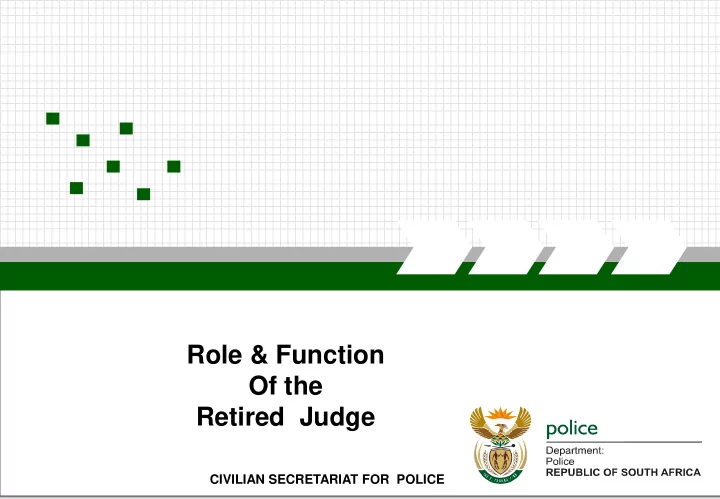

Role & Function Of the Retired Judge CIVILIAN SECRETARIAT FOR POLICE CIVILIAN SECRETARIAT FOR POLICE
TABLE OF CONTENTS • Introduction • Background • Objectives • Mandate • Powers of the retired judge • Reporting Mechanisms 11/20/2014 CIVILIAN SECRETARIAT FOR POLICE 2
INTRODUCTION Section 17L of the South African Police Service Act calls for the Minister of Police after consultation with the Minister of Justice and the Chief Justice to appoint a retired Judge that will investigate • Complaints from the members of the Public about the unlawful infringement of their rights caused by an investigation by the Directorate. AND • Complaints by members of the Directorate in respect of alleged improper influence or interference of their investigations. 11/20/2014 CIVILIAN SECRETARIAT FOR POLICE 3
INTRODUCTION CONT … Civilian Secretariat • The Act further compels the Civilian Secretariat for Police to in consultation with the Judge to develop and implement a communication plan to promote awareness amongst the public and the members of the Directorate on the functions and the role of the Judge. 11/20/2014 CIVILIAN SECRETARIAT FOR POLICE 4
BACKGROUND • Purpose of the briefing is to make the personnel of the Directorate aware of the mandate of the Judge as spelt out in the Section 17L of the SAPS Act , • Section 17 L ensures that the DPCI focuses on its mandate by addressing national priority offences without any fear , diversions or interference. 11/20/2014 CIVILIAN SECRETARIAT FOR POLICE 5
OBJECTIVES • To create awareness about the complaints mechanism set out in section 17L of the SAPS Act ( Retired Judge ) • To raise awareness of the role , functions and powers of the Judge • To enhance confidence , impact and efficiency of the DPCI members as a result of the appointment of the retired Judge. 11/20/2014 CIVILIAN SECRETARIAT FOR POLICE 6
MANDATE The mandate of the Retired Judge is taken from: • Section 17L of the SAPS Act AND • DPCI Integrity Regulations 11/20/2014 CIVILIAN SECRETARIAT FOR POLICE 7
MANDATE CONT... • The retired Judge is precluded from investigating complaints about intelligence matters falling under the jurisdiction of the Inspector- General of Intelligence. • The Judge does not usurp the functions of the IPID ( see section 17L ( 2 ) of the SAPS Act. 11/20/2014 CIVILIAN SECRETARIAT FOR POLICE 8
MANDATE CONT… The retired Judge may upon receipt of a complaint either investigate or refer such to, amongst others: the Civilian Secretariat for Police , the IPID, the National Commissioner, the National Head of the Directorate, the relevant Provincial Commissioner, the National Director of Public Prosecutions, the Inspector General of Intelligence, or any institution mentioned in chapter 9 of the Constitution of the Republic of South Africa 1996. 11/20/2014 CIVILIAN SECRETARIAT FOR POLICE 9
MANDATE CONT… • The retired Judge must report the outcome of any investigation undertaken by him or any referral to the Minister of Police. 11/20/2014 CIVILIAN SECRETARIAT FOR POLICE 10
POWERS OF THE RETIRED JUDGE The Retired Judge may / Is • Obtain information and documents under the control of SAPS, • Enter any building or premises of the SAPS in order to obtain such information and documents, • Entitled to all reasonable assistance by a member of the SAPS. NB : REFUSAL BY SAPS MEMBERS TO COMPLY WITH THE REQUEST OF THE REQUIRED JUDGE IS A CRIMINAL OFFENCE. 11/20/2014 CIVILIAN SECRETARIAT FOR POLICE 11
POWERS THE RETIRED JUDGE • The National Head of the Directorate may also request the retired Judge to investigate complaints or allegations relating to investigations by the Directorate or alleged interference with such investigations. • According to section 17L (4) the member of the Directorate is not compelled to lodge a complaint that regards the mandate of the Judge via his /her management structures, but such member may have evidence at his proposal • Any member who makes a complaint in terms section 17L shall not be entitled to use this section to establish whether there is an investigation against him or her, nor be entitled to any delay, interference or termination of such investigation on the basis that such complaint has been made. • The retired Judge may request and obtain information from the National Director of Public Prosecution in so far as it may be necessary for the Judge to conduct an investigation. 11/20/2014 CIVILIAN SECRETARIAT FOR POLICE 12
FORM AND MANNER OF COMPLAINTS • A complaint shall be made in writing in the form set out in Annexure 1 of the DPCI integrity regulations • A complaint made may be lodged by e-mail, fax or post or be delivered at the office of the retired judge.(see the last slide) • The retired judge may require from any complainant to submit any allegations made to him or her in the form of an affidavit. • Complaints may also be lodged at any Independent Police Investigative Directorate offices (IPID), which shall ensure that the complaint is submitted to the retired judge without any delay. • A person, who wishes to lodge a complaint at an office of the IPID, shall be assisted by personnel of the IPID to complete the prescribed form, if so requested. 11/20/2014 CIVILIAN SECRETARIAT FOR POLICE 13
TYPES OF COMPLAINTS Category 1 Complaint • Shall be a complaint by any member of the public in terms of section 17L(4)(a) who can provide evidence of a serious and unlawful infringement of his or her rights caused by an investigation of the Directorate. Category 2 Complaint • Shall be a complaint by a member of the Directorate who can provide evidence of any improper influence or interference whether of a political or other nature, exerted upon him or her regarding the conducting of an investigation. 11/20/2014 CIVILIAN SECRETARIAT FOR POLICE 14
JUDGE’S CONTACT DETAILS Professional Assistant: Bongiwe Maselana c/o 9 th Floor, 120 Plein Street, Cape Town 8000. Tell: 021 467 7027 Cell: 082 459 3459, e-mail: MaselanaB@dpcijudge.gov.za 11/20/2014 CIVILIAN SECRETARIAT FOR POLICE 15
Recommend
More recommend